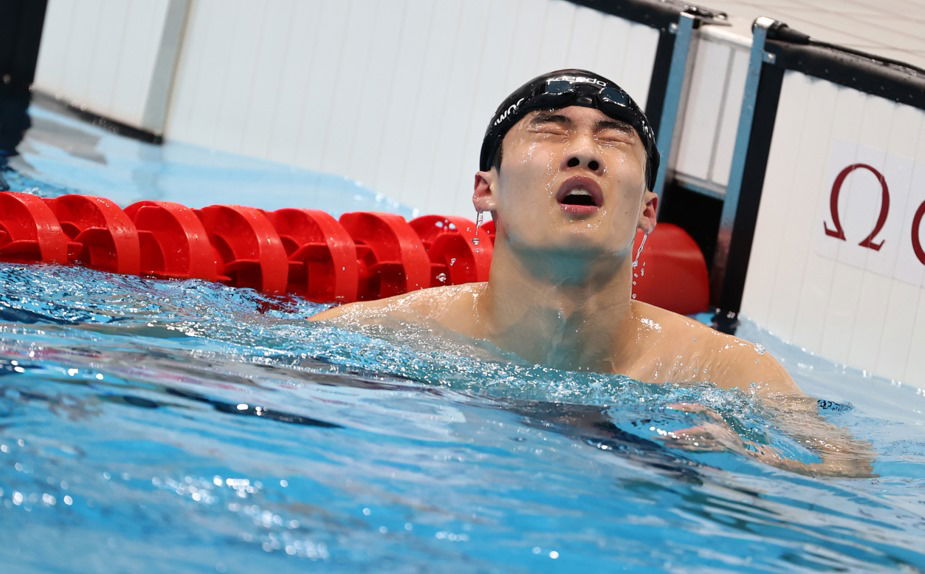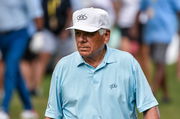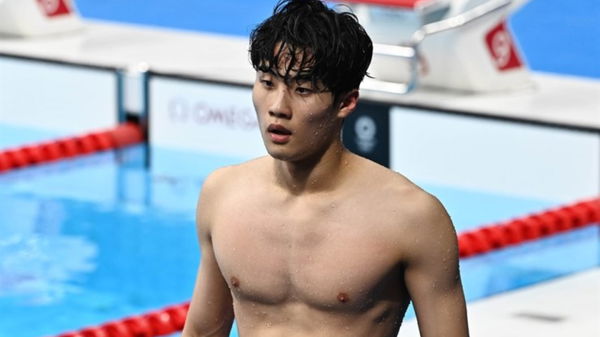

The deafening roar of the crowd filled the Paris La Défense Arena as the world’s swimming giants converged for the men’s 4x200m freestyle relay. Amidst the electric atmosphere, South Korea, a rising force in the swimming world, stepped onto the Olympic stage for the first time in a relay final, their hearts brimming with ambition and dreams of a historic medal. However, their hopes were soon dashed as Great Britain, the defending champions, flexed their aquatic muscles, leaving the South Koreans in their wake and securing a second consecutive gold. This crushing defeat raised questions about what went wrong for the South Korean swimming team.
Watch What’s Trending Now!
The South Korean team, comprising Yang Jae-hoon, Lee Ho-joon, Kim Woo-min, and Hwang Sun-woo, found themselves trailing from the outset, with Yang’s leadoff leg of 1:49.84 putting them at a significant disadvantage. Despite a valiant effort by Hwang, whose anchor leg of 1:45.99 was the team’s fastest, they could only manage a sixth-place finish with a time of 7:07.26. This outcome stood in stark contrast to their gold medal-winning performance at the Asian Games just a year prior, where they set a national and Asian record of 7:01.73. The weight of expectations and the pressure of the Olympic stage proved to be a formidable challenge for the young team. However, this was not the first time they faced hurdles on their Olympic journey.
ADVERTISEMENT
Early struggles that sealed the South Korean Swimming Team’s fate
The race unfolded with a sense of urgency as each team dove into the water, vying for supremacy. South Korea’s hopes were dealt an early blow, however, as leadoff swimmer Yang Jae-hoon fell behind, leaving his teammates with a considerable gap to close. Despite a valiant effort by anchor Hwang Sun-woo, who dragged the team up to sixth place, the damage had already been done. The disappointment was evident in their faces as they emerged from the pool.
“Although the result was not what we wanted, this is not the end for us,” Hwang Sun-woo reflected, a sentiment echoed by his teammate Kim Woo-min, who emphasized that this setback would only fuel their determination for future success. Their words revealed a team grappling with the reality of their performance, but also a team unwilling to give up.
Top Stories
NFL Suspends Chargers’ Denzel Perryman for Two Games Over Cowboys Incident

Clark Hunt Admits Being Pressured to Leave Arrowhead After Chiefs Offered $2.4B Proposal

Lee Trevino, 86, Leaves Golf World Hanging on Every Word at PNC: ‘I’ve Been Digging Worms’

Steelers Confirm $45M Punishment for DK Metcalf After NFL Suspended WR for 2-Games

Sean McDermott Confirms if Bills Will Sign a QB Amid Josh Allen’s Injury Concerns

Trent Williams Announces Retirement Plans After 49ers Clinch Playoff With Win vs Colts

The South Korean swimming team, having shattered national and Asian records in the same event just a year ago, found themselves nearly six seconds off their best time. This stark contrast underscored the high stakes and immense pressure of the Olympic stage. But while the South Koreans struggled, another team was basking in the glory of victory.
ADVERTISEMENT

ADVERTISEMENT
Despite South Korea’s major efforts, GB claimed its second consecutive Olympic gold medal in the 4x200m freestyle relay, with swimmers like James Guy, Tom Dean, Matthew Richards, and Duncan Scott making a strong bid to defend their title this Olympic season. Even though Team GB saw tough-and-go situations firsthand, after the miss by Matthew Richards, it was a big-time win! Notably, this win was a big affair; until the 2021 Olympic season, Great Britain kept watch on the gold for over a century! It’s a good stretch, isn’t it?
“Before victory in Tokyo, Britain had waited 112 years for a gold medal in an event that had become America’s preserve. Now, they’ve won it twice in three,” remarked a journalist from The London Evening Standard, highlighting the magnitude of their achievement. Scott’s exceptional final leg, described as ‘magnificent’ by onlookers, sealed their triumph and solidified their status as swimming legends, with their performances standing as a stark reminder of the competitive nature of the sport.
ADVERTISEMENT
A disappointing outcome—but not the end
The South Korean swimming team’s disappointment was palpable, as the weight of their nation’s expectations bore down on them. Hwang Sun-woo, the 2024 world champion in the 200m freestyle, had already faced setbacks in his individual events, and this relay loss further compounded his frustration. This disappointment was not just an individual feeling, but a collective one shared by the entire nation.
However, in the face of adversity, the South Korean swimming team demonstrated resilience and a commitment to growth. Kim Woo-min, the 400m freestyle bronze medalist, eloquently captured their spirit, stating, “We spent the past three years building up for this event. Although this one is over for us, we still have a long road ahead of us… We will use this bit of disappointment as our fuel and try to go even higher next time.” His words echoed the sentiments of a team determined to learn from their mistakes and come back stronger.
ADVERTISEMENT
Although the freestyle relay race was a big-time hit for Team GB as they sustained their defending title without a doubt, the event did not go as skillfully for the South Korean swimming team. Yet, win or lose is part of the game; it will be intriguing to watch if South Korea turns its losses into wins going forward in the Paris Olympics. Because, after all, the Olympics are not just about winning or losing; they are also about the spirit of competition, resilience, and the pursuit of excellence.
ADVERTISEMENT
ADVERTISEMENT
ADVERTISEMENT

